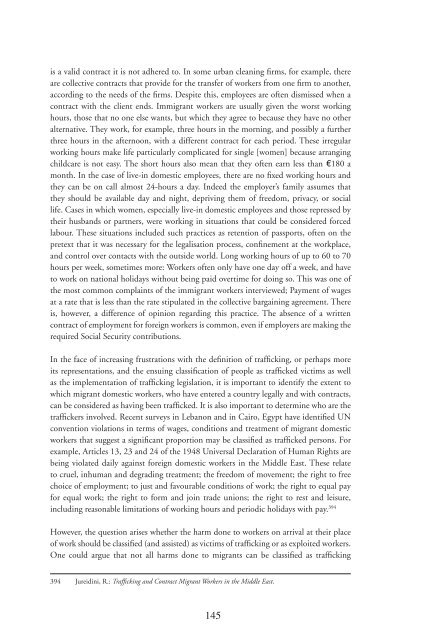Trafficking in human beings: human rights and ... - unesdoc - Unesco
Trafficking in human beings: human rights and ... - unesdoc - Unesco
Trafficking in human beings: human rights and ... - unesdoc - Unesco
You also want an ePaper? Increase the reach of your titles
YUMPU automatically turns print PDFs into web optimized ePapers that Google loves.
is a valid contract it is not adhered to. In some urban clean<strong>in</strong>g fi rms, for example, there<br />
are collective contracts that provide for the transfer of workers from one fi rm to another,<br />
accord<strong>in</strong>g to the needs of the fi rms. Despite this, employees are often dismissed when a<br />
contract with the client ends. Immigrant workers are usually given the worst work<strong>in</strong>g<br />
hours, those that no one else wants, but which they agree to because they have no other<br />
alternative. They work, for example, three hours <strong>in</strong> the morn<strong>in</strong>g, <strong>and</strong> possibly a further<br />
three hours <strong>in</strong> the afternoon, with a different contract for each period. These irregular<br />
work<strong>in</strong>g hours make life particularly complicated for s<strong>in</strong>gle [women] because arrang<strong>in</strong>g<br />
childcare is not easy. The short hours also mean that they often earn less than €180 a<br />
month. In the case of live-<strong>in</strong> domestic employees, there are no fi xed work<strong>in</strong>g hours <strong>and</strong><br />
they can be on call almost 24-hours a day. Indeed the employer’s family assumes that<br />
they should be available day <strong>and</strong> night, depriv<strong>in</strong>g them of freedom, privacy, or social<br />
life. Cases <strong>in</strong> which women, especially live-<strong>in</strong> domestic employees <strong>and</strong> those repressed by<br />
their husb<strong>and</strong>s or partners, were work<strong>in</strong>g <strong>in</strong> situations that could be considered forced<br />
labour. These situations <strong>in</strong>cluded such practices as retention of passports, often on the<br />
pretext that it was necessary for the legalisation process, confi nement at the workplace,<br />
<strong>and</strong> control over contacts with the outside world. Long work<strong>in</strong>g hours of up to 60 to 70<br />
hours per week, sometimes more: Workers often only have one day off a week, <strong>and</strong> have<br />
to work on national holidays without be<strong>in</strong>g paid overtime for do<strong>in</strong>g so. This was one of<br />
the most common compla<strong>in</strong>ts of the immigrant workers <strong>in</strong>terviewed; Payment of wages<br />
at a rate that is less than the rate stipulated <strong>in</strong> the collective barga<strong>in</strong><strong>in</strong>g agreement. There<br />
is, however, a difference of op<strong>in</strong>ion regard<strong>in</strong>g this practice. The absence of a written<br />
contract of employment for foreign workers is common, even if employers are mak<strong>in</strong>g the<br />
required Social Security contributions.<br />
In the face of <strong>in</strong>creas<strong>in</strong>g frustrations with the defi nition of traffi ck<strong>in</strong>g, or perhaps more<br />
its representations, <strong>and</strong> the ensu<strong>in</strong>g classifi cation of people as traffi cked victims as well<br />
as the implementation of traffi ck<strong>in</strong>g legislation, it is important to identify the extent to<br />
which migrant domestic workers, who have entered a country legally <strong>and</strong> with contracts,<br />
can be considered as hav<strong>in</strong>g been traffi cked. It is also important to determ<strong>in</strong>e who are the<br />
traffi ckers <strong>in</strong>volved. Recent surveys <strong>in</strong> Lebanon <strong>and</strong> <strong>in</strong> Cairo, Egypt have identifi ed UN<br />
convention violations <strong>in</strong> terms of wages, conditions <strong>and</strong> treatment of migrant domestic<br />
workers that suggest a signifi cant proportion may be classifi ed as traffi cked persons. For<br />
example, Articles 13, 23 <strong>and</strong> 24 of the 1948 Universal Declaration of Human Rights are<br />
be<strong>in</strong>g violated daily aga<strong>in</strong>st foreign domestic workers <strong>in</strong> the Middle East. These relate<br />
to cruel, <strong>in</strong><strong>human</strong> <strong>and</strong> degrad<strong>in</strong>g treatment; the freedom of movement; the right to free<br />
choice of employment; to just <strong>and</strong> favourable conditions of work; the right to equal pay<br />
for equal work; the right to form <strong>and</strong> jo<strong>in</strong> trade unions; the right to rest <strong>and</strong> leisure,<br />
<strong>in</strong>clud<strong>in</strong>g reasonable limitations of work<strong>in</strong>g hours <strong>and</strong> periodic holidays with pay. 394<br />
However, the question arises whether the harm done to workers on arrival at their place<br />
of work should be classifi ed (<strong>and</strong> assisted) as victims of traffi ck<strong>in</strong>g or as exploited workers.<br />
One could argue that not all harms done to migrants can be classifi ed as traffi ck<strong>in</strong>g<br />
394 Jureid<strong>in</strong>i, R.: Traffi ck<strong>in</strong>g <strong>and</strong> Contract Migrant Workers <strong>in</strong> the Middle East.<br />
145

















